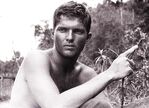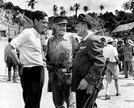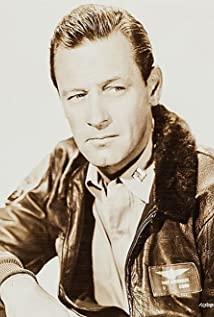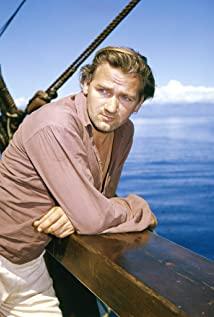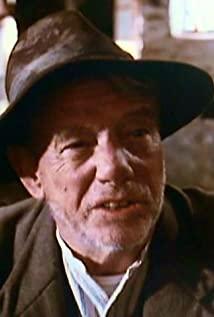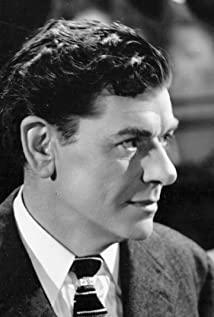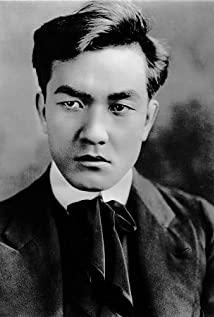The protagonist, Colonel Nicolson, is played by "The Man of Thousand Faces" Alec Guinness. When I watched the film, I didn't recognize the vicissitudes of old Obi-wan Kenobi in the Star Wars trilogy. The colonel is a principled person, with a trace of perseverance between his eyebrows. After being confined for several days, his tortured face is pale and thin (the makeup artist is too scary, it is the effect of a zombie!), he is already weak to the limit. Without being supported by others, when I met Colonel Saito (Google told me that it should be translated as Saito), the Japanese army officer did not eat hard and soft. In the end, Mr. Saito's mentality was too big and compromised. From the several confrontations between him and Colonel Saito, it can be seen that this adherence to principles stems from his own pride. Nicolson asked Saito to abide by the Geneva Convention made by the "civilized man" and strongly opposed the Japanese army's recruitment of British officers to repair the bridge; and after taking over the construction of the River Kwai Bridge, he took it seriously as a career and mobilized his work spirit. After careful investigation and careful study, the high emotions were compared with Saito's despair, as if Saito was the prisoner, and the reversal of the situation was unexpected. What is even more shocking is that due to insufficient manpower to complete the project on time, Nicolson took the initiative to order the officers to participate in the labor, and even the patients in the hospital to help. If there is no plot of the previous struggle, I would almost suspect that the colonel is a patient with Stockholm syndrome. If you tell Saito who is in pain and crazy in the room after Nicolson is released, there will be such a scene, I don't know how he will feel. This plot clearly indicates one point: What Nicolson swears to defend is not rigid rules, but personal dignity. The reason why the River Kwai Bridge is so meaningful to him, as he said, the joint effort to build this bridge allows the soldiers to unite and cooperate and be disciplined. At this time, they are worthy of being called soldiers, not slacking and desperate slaves. Nicolson is not willing to fall into a desperate situation. He wants to do something meaningful, and the threat of the built bridge to the so-called national interests does not seem to be within his consideration. A prisoner in war must work. When the River Kwai Bridge was built, Nicolson ordered a wooden sign to be nailed to the pillar, which specifically indicated that the bridge was built by British soldiers.
Colonel Nicolson's outlook on life is worth exploring. As a soldier, he is not without national interests. When the young soldier Joyce told him that the British army had sent a small unit to blow up the River Kwai Bridge, he suddenly realized that what he had done had actually helped the enemy. However, when in the captive camp, the sultry and humid climate in South Asia, the crude living conditions and the boundless sinister jungle formed an atmosphere of irresistible despair. This atmosphere was enough to dilute the ethereal things of national justice. The colonel at this time obviously believed that alive posture was the most important. What the colonel did can be regarded as a positive attitude to life in a sense: fighting the harsh environment and trying to make a difference. However, the ending of the movie was almost a vicious slap in the face. Working hard and meaningless, this may be the truth of life. There are always risks in action. If you want to avoid risks, you can only accomplish nothing. Everyone understands this, but few people realize that the so-called risk includes such a situation: your action direction is completely wrong, your results Will be ruined for reasons recognized by others and even yourself. In fact, no one can leave something that lasts forever, especially by discarding the ever-evolving natural sciences. It is only a matter of time before a person's achievements are partially or completely overturned, but this process often occurs after the death of the person involved, not as thrilling as the colonel experienced. This film may provide aspiring people with a necessary psychological preparation: not only to be ready to accomplish nothing, but also to accept the possibility that the results of all struggles are meaningless.
Let's discuss the attitudes of other characters in the film. Shears, who escaped from the captive camp, is obviously a representative of living for life. If there is no way out, he will never return to South Asia to participate in the task of bombing the bridge. For him, a comfortable life is more important than anything else. But it may be too simple to just think of Shears as a hedonist. When the leader of the bridge bombing team, the injured Warden asked to leave himself in the jungle and let Shears lead the rest of the people to set off first, he sternly refused and let The local woman carried him on a stretcher on the road. At this moment, his ideals and goals are standing on the moral high ground and arguing, but the glimmer of humanistic care is faintly flickering on him. As for Warden, they are almost Nicolson's counterpart, and Warden also accused them of being desperate for their goals. It's just that Warden happened to do what the times thought was right.
Going back to my life, thinking about how to avoid Colonel Nicolson's tragedy, only to find that it seemed impossible. Nicolson did not realize the threat of the River Kwai Bridge to the interests of Britain in the war, nor can we predict what effect our actions will have in the future. Risks are inevitable, and I would rather adopt the attitude of Colonel Nicolson and maintain a good posture. Struggling for a lifetime with a clear conscience, this is probably the only risk I am willing to take under the life creed that I have always tried to avoid risks. If not, I will also become a slave to a life of laziness and despair.
PS. There is a plot in the movie that Saito wrote a letter on the night when the Bridge of Kwai was built, and then cut off a bunch of hair and clamped it in the letter. Who can tell me what this means?
View more about The Bridge on the River Kwai reviews



